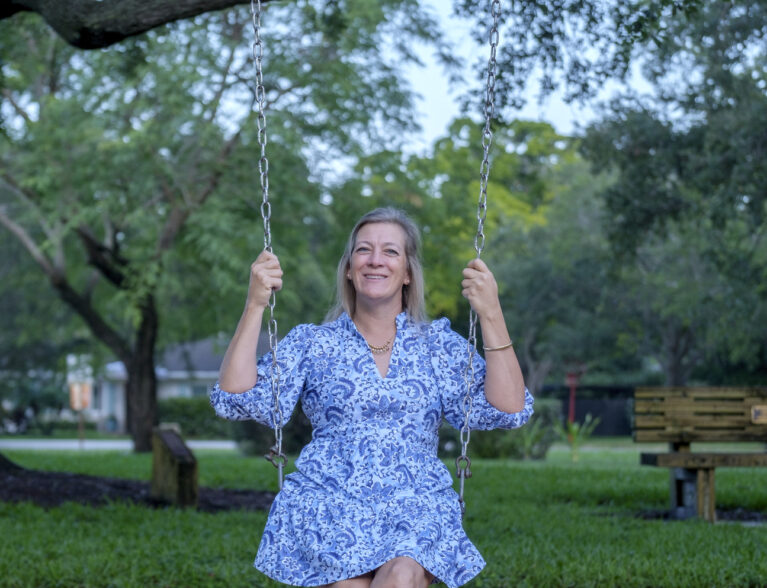
If there’s anyone who knows how to put some childlike fun in their life, it’s Gwen Zorc. Not only is she an LMHC (Licensed Mental Health Counselor) with her a practice in Vero Beach, but as the mom of 11, she had children aged between 1 to 5 for 22 years!
“Toddlers are allowed to be whimsical,” says Zorc. “We need to share that with them. For 22 years, when I played with my children, I was nurtured by participating in the fun we shared.”
Dr. Hasan Merali, associate professor of pediatrics at McMaster University and author of “Sleep Well, Take Risks, Squish the Peas: Secrets from the Science of Toddlers for a Happier, More Successful Way of Life,” hates the terms “terrible twos” and “three-ager.”
He admits tantrums are a fact of life at that age, but says they’re brief in duration and the rest of the time these children are finding joy in everyday things.
Dr. Merali offers some suggestions on what you can do to enjoy life like a toddler.
Try positive self-talk. Young children tend to coach themselves out loud. Research suggests that for adults, positive self-talk can help with problem-solving, learning, confidence and managing your emotions. Don’t be embarrassed to encourage yourself.
Take any opportunity to move. Two-year-olds move joyfully and instinctively. Adults can look for ways to move more, even if it’s just for a minute. Take a quick walk around the block. If you’re home alone, sing and move to your favorite song. Brief bursts of activity have been shown to increase longevity if they add up to 10 minutes per day.
Ask questions. Young kids are not afraid to pose questions – one study found that they asked an average of 107 questions an hour. Adults have been socialized to hold back our questions because we’re often worried about what other people think, but asking questions not only helps us to gain information, it’s also an important way to build relationships.
Fix your sleep schedule. Toddlers thrive on routine, and having a schedule with consistent sleep and waking times will help you, too. If your schedule permits, napping has a host of benefits, including sharper thinking and reaction times and improved memory.
Look for opportunities to laugh. Toddlers “see the world as a comedy club,” Dr. Merali writes. One study found that young children laugh six times as much as adults. But we can seek ways to build playfulness and humor into our day. Listen to a comedy podcast or trade silly texts with someone. Research shows you laugh more when you are with friends, so make time for them, he said.
In our hectic, modern lives, many of us focus so heavily on work and family commitments that we never seem to have time for pure fun, according to HelpGuide.org, an independent nonprofit mental health website.
Somewhere between childhood and adulthood, we stopped playing. When we carve out some leisure time, we’re more likely to zone out in front of the TV or computer than engage in fun, rejuvenating play like we did as children. But play is not just essential for kids; it can be an important source of relaxation and stimulation for adults as well.
Playing with your romantic partner, friends, co-workers, pets and children is a fun way to fuel your imagination, creativity, problem-solving abilities, and emotional well-being. Adult play is a time to forget about work and commitments, and to be social in an unstructured, creative way.
Play could be simply goofing off with friends, sharing jokes with a coworker, throwing a frisbee on the beach, dressing up on Halloween with your kids, building a snowman in the yard, playing fetch with a dog, acting out charades at a party, or going for a bike ride with your spouse with no destination in mind. There doesn’t need to be any point to the activity beyond having fun and enjoying yourself. By giving yourself permission to play with the joyful abandon of childhood, you can reap oodles of health benefits throughout life.
Zorc says that generational changes in parenting have allowed children to show their joy more openly. “For a long time, children were seen and not heard,” she says. “But now parents want their children to feel important and heard, so they are able to show their feelings more readily.”
She uses patients’ happy childhood memories in her counseling sessions to encourage healthy self-care and positive steps to wellbeing. “I tell my patients to think back to what they loved doing when they were children. That’s your homework for this week.”
The Early Childhood Development Association (ECDA) discusses the value of silliness for both kids and adults, stating that while we all can use a good laugh every now and then, no one appreciates silliness more than children.
But as parents, we might find it useful to follow children’s lead in the potent pursuit of silliness. Collaborative play that features contingency, power reversal, and role reversal can be fun not only for the little ones, but also for the adults.
Gwen Zorc, M.Ed., LMHC, is a Vero Beach native. She received her master’s degree in Counselor Education from Florida Atlantic University. Her practice, Splash Counseling, is located at 2770 Indian River Blvd., Suite 402K, Vero Beach. She is accepting new patients. Call 772 879-5585 or visit splashcounseling.com.



